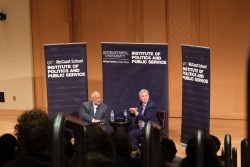Campus workers and students were unable to voice their demands after being denied entry to a closed meeting of the Advisory Committee on Business Practices yesterday afternoon.
ACBP is a committee that facilitates communication and monitors Georgetown University’s sub-contractors.
According to Gladys Cisneros (SFS ‘04), six months after the instatement of the Just Employment Policy, campus workers are still not receiving the promised increase in their compensation packages.
Cisneros has been working on the living wage campaign for four years.
Instated in July 2005, the University promised full-time campus workers “fair and competitive compensation packages” through the Just Employment Policy, increasing wages to a minimum of $13.00 an hour, an increase from its prior minimum of $11.33 an hour.
According to Assistant Vice President for Communications Erik Smulson, the benefits comply with the Just Employment Policy, and will continue to increase as the years go on.
The policy takes into account seven components, including the cost of housing, health care, child care, transportation, taxes, food and other basic necessities.
Yesterday’s demands, written by the Georgetown Living Wage Coalition, include a requirement for “full demonstration” of wages, which incorporate all seven components of the Just Employment policy, as well as a message from the University demanding its sub-contractors to recognize their employees’ labor unions.
“Right now, benefits include healthcare, bereavement leave, sick leave and two weeks worth of vacations,” Cisneros said. “Those components are not the cost of living. (www.peakfighting.com) ”
Workers from Georgetown’s sub-contracted firm, P&R Enterprises, have been trying to unionize with the Service Employees International Union 32JB, but P&R management have warned them against it.
The Just Employment policy allows for all campus workers to “freely associate and organize.”
“The university allows unionization, but P&R Enterprises may have a problem with it,” said SEIU 32JB representative Miladys Bautista. “Some people are scared of being put out of work.”
The SEIU 32JB has over 80,000 members, representing over 40 companies. It started helping P&R workers get representation after the Georgetown Solidarity Committee’s hunger strike last March, Bautista said.
The ACBP must include three undergraduate students, three faculty members, University administrators, a member of the Jesuit community and three staff members.
Currently, however, no staff members are represented in the committee.
“Worker representatives aren’t elected democratically,” Cisneros said. Instead, campus workers must be approved by University Senior Vice President Spiros Dimolitsas.
Campus workers were not allowed into the meeting, despite a fervent-turned-violent attempt by GSC members to bypass Department of Public Safety police.
Approximately 15 Department of Public Safety officers blocked five students from entering the building.
“Georgetown, by not producing resolutions for a living wage through the committee, they are pushing students to direct action,” said Geoff Piquette (SFS ‘06), who was injured while struggling to break through the DPS guards.
The ACBP will have another meeting in two weeks, where P&R Enterprise workers will gain admission only if approved by Dimolitsas as part of the committee.
The University has until March 14 to adhere to the two demands for the sub-contracted workers, according to GSC.
“Living wage needs reality, not just a piece of paper,” Piquette said.




